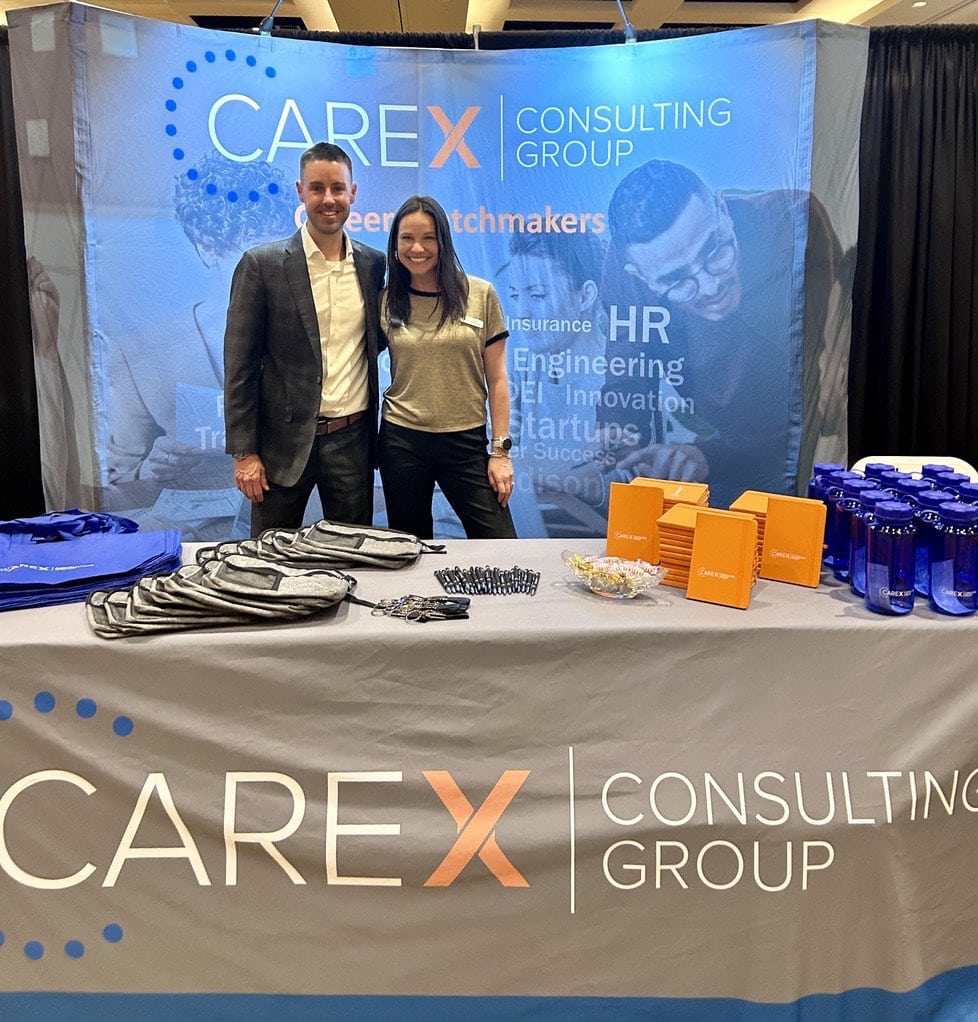The role of human resources (HR) in shaping successful organizations cannot be overstated. It is in this dynamic and challenging arena that Jennifer ...
How Carex Consulting Matches Top Talent with Employers
Written by: Esther Strauss
Esther is a business strategist with over 20 years of experience as an entrepreneur, executive, educator, and management advisor.
Published on July 16, 2024

We recently had the opportunity to sit down with Bill Neill, the chief operations officer and co-founder of Carex Consulting Group. With a wealth of experience in enterprise staffing solutions, Bill has been instrumental in driving the company’s growth and commitment to personalized, effective recruitment strategies.
In our conversation, Bill shares insights into the unique approaches Carex takes to connect top talent with employers, the importance of understanding company culture, and the evolving trends in the staffing industry.
Inspiration Behind Carex Consulting
SBS – What inspired you to start Carex Consulting Group?
Bill – I started in the industry as a consultant for several staffing firms. I loved the idea that one single company could connect people with jobs from a range of employers, but I hated the transactional way they operated. The traditional approach was to charge the client as much as possible for my time and to pay me as little as possible, thereby making a margin. I thought — What if we told everyone (clients and candidates) our margin up front, so everyone knows how much they get? Then we could focus on finding the right fit instead of maximizing commissions. We found that this mentality and unique approach changed the candidate experience and generated lasting matches between employers and new hires.
Understanding Client Needs and Company Culture
SBS – Can you describe your approach to understanding a client’s company culture and needs?
Bill – The best way to think of Carex Consulting Group is as a career matchmaker set on finding the ultimate match for both the candidate and that specific company’s needs. A big part of that is ensuring the employee is the right culture fit. It’s important that we listen intently to the client and understand their expectations, and then we ask a standard battery of questions… but what isn’t said or implied is where you really get a leg up, we tend to be conscious of that. For example, “This is the kind of work environment where people respond to emails after hours” — this type of expectation is very rarely stated explicitly, but we can be the translator and filter out folks that would not thrive in a fast-paced environment or an office with higher expectations.
Ensuring Candidate-Employer Fit
SBS – How do you ensure a good fit between candidates and employers?
Bill – DON’T FORCE IT. Of course you need someone to align with the tactical requirements of the role. Of course you need to align culturally. We talk with our employer partners about the hesitations and bright spots for individual candidates. We go through each one and they can tell us how much of a deal breaker it is or if we’ve got room to wiggle based on excellence elsewhere.
Challenges in the Staffing Industry
SBS – What are the biggest challenges in the staffing industry today?
Bill – While AI and technical changes continue to shift things, the biggest challenge is not due to technology… In fact it’s not even a new problem. As an industry, we’ve done a bad job of building trust with employers and articulating the value we bring. Staffing firms tend to be transactional focused because the firm only gets paid when they fill a job and the staff all gets bonuses. That creates an environment where your service provider can’t say “I don’t think this is a good idea” because they’ll lose all the commission they were hoping for. We compensate staff members almost exclusively with salary and an annual profit share to incentivize long term thinking and partnership building. We think we come out ahead in the long run by positioning ourselves as a trusted advisor.
Keeping Up with Industry Trends
SBS – How do you keep up with industry trends and evolving client needs?
Bill – Our president compiles a monthly labor market insights report and I wait on bated breath for that analysis. He does such a good job of consuming JOLTS and BLS data to form a story of market conditions based on data. We host lunches and panels for TA leaders to come together and discuss new developments or trends seen across many enterprises in our home market. It is a must that we stay on the forefront of all these things.
Impact of Remote Work on Staffing
SBS – How has the demand for remote work affected your business?
Bill – Remote work has opened up new pools of potential talent which makes it easier to find great matches. I no longer need to find a data engineer who already lives in Naples, FL (or is willing to move); now I can find any data engineer across the country! Conversely, many employers are pairing back their remote policies or introducing some hybrid blending.
Recruiting Top Talent in Competitive Fields
SBS – What strategies do you use to recruit top talent in competitive fields like IT and healthcare?
Bill – There are no silver bullets, but I find taking the long-term view yields great results. Building a relationship with candidates that transcends a single job search builds trust. Then you have a warm lead to call once you hear about the job. We’ve found that helping our client partners with simple workforce planning exercises will help us start a search before the job even comes out. Then we effortlessly have great people to bring forth, but it’s really because we started working on it months ago.

Supporting Candidates in Job Search
SBS – How do you support candidates during their job search and placement process?
Bill – We support our candidates with domain expertise and transparency.
Expertise — We want our recruiters to be a fountain of knowledge, helping the candidate make the decision that’s best for them. For example, we may say, “Here’s what roles of that nature typically pay. You’d need xyz certifications before you could be considered for something like that. ABC company uses a similar tech stack, maybe we should look there too!”
Transparency — So few recruiters will take the time to let you know you didn’t get the job. Come on! It’s not a fun conversation but it is critical to inform the candidate of any feedback or gaps the employer identified. Vetting that this is fit for the candidate, I key too, “I suspect that will turn into a support and maintenance role. Would losing the implementation aspect disappoint you?”.
Role of Technology in Recruitment
SBS – What role does technology play in your recruitment process?
Bill – We use a number of automated workflows to save our staff time. Ultimately, any time saved in the process can be used to have more meaningful candidate conversations. We use technology to inform candidates on the status of the job. We use automations to create shell records so any relevant information is already in the ATS when the call starts. We remind ourselves to wish staff a happy birthday. The more the computer does, the more time we have to spend with people.
Promoting Diversity, Equity, and Inclusion
SBS – What initiatives has Carex taken to promote diversity, equity, and inclusion?
Bill – Our recruiting team is led by a diversity-certified recruiter, and we’ve put several of our recruiters through the training as well. While we’re happy to opine on DEI processes, we also have partnership with specialized firms if a client partner has a particular need.
Tips for Improving Hiring Practices
SBS – Can you share any tips for businesses looking to improve their hiring practices?
Bill – Treat candidates like they’re a rare commodity. No one likes to suffer through another set of interviews “just because.” Don’t ghost the candidate for two months and then invite them to interview (psssst! If they’re good, they already found another job). Treating every candidate like royalty makes them likely to reapply in the future and widens your net of potential hires. You might even find a diamond in the rough.
Advice for New Staffing Entrepreneurs
SBS – What advice would you give to new entrepreneurs in the staffing industry?
Bill – Staffing is the rebounding (think basketball) of the business world. It’s all about grit, hustle, and making deposits in the karma bank. Your initial value proposition isn’t the size of your database or how rich your company benefits are. It’s about being laser focused on solving problems for your customers so they come back in the future.
Future Trends in Staffing and Recruitment
SBS – What future trends do you foresee in the staffing and recruitment industry?
Bill – I think HR tech is an interesting frontier, especially with the availability of AI APIs. I view these technology solutions as assistive rather than transformative technology. For example, a program rewrites the resume to better speak to the job requirements. It’s not replacing a recruiter but helping.
Subscribe to Our Newsletter
and gain insider access to cutting-edge business insights and trends.
Featured Resources

Jennifer Opare-Aryee: Redefining HR Consulting in Key Sectors
Published on November 23, 2023
Read Now

5 Best Job Posting Sites for Employers
Published on October 2, 2023
Did you know that, according to surveys, 74% to 85% of open positions are never even advertised? This startling statistic underscores the hidden job ...
Read Now

19 Top Consulting Business Ideas for Aspiring Advisors
Published on June 6, 2022
If you’re looking for a business to start, consulting offers a world of options. The US consulting industry has grown 30% in the last decade torea ...
Read Now
Comments